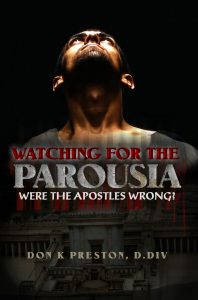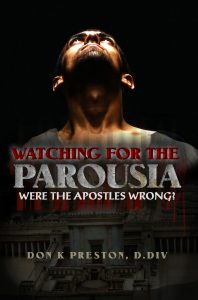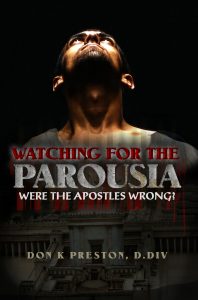Kenneth Gentry: Confused, Confusing and Desperate- #2


Kenneth Gentry, Confused, Confusing and Desperate! #2
This is the second installment of my response to four articles by Kenneth Gentry, posted on his blog, in which he attacks my new book, Watching for the Parousia: Were Jesus’ Apostles Confused? Be sure to read tthat first article.
Gentry continues:
Like Joseph Smith, founder of the “Latter-day Saints” cult, Hyper-preterists have created a whole new theology. That is, they are not just differing from evangelical Christianity on a few eschatological issues. Their innovative approach to Scripture has generated a full-blown, radically new theology, which is set over against historic Christian orthodoxy. [1] In fact, Hyper-preterism borders on being cultic — partly due to the rabid, argumentative nature of its adherents. Apparently, they also are developing their own ritual holy weeks, for Preston even mentions a gathering called the “Preterist Pilgrim Weekend” (pp. 49, 65). This must be like the pilgrim festivals in Scripture. I expect that one day, one of them will attempt to write A New Systematic Theology of the Preterist Faith. Or even publish a Preterist Study Bible with penciled-in corrections.
Response:
Gentry’s comments here are nothing but an attempt to “poison the well”, i.e. to poison the mind of his readers. After all, everyone knows the Mormons are false! Preterists are like those misguided, cultic Mormons! In fact, preterism “borders on being cultic.”
This charge borders on outright slander. Either Gentry does not know the leading characteristics of a cult (identified by those who know them)– or, if he knows them, he is purposefully and willfully making a false charge, slandering preterists.
Just a few of the identifying markers of a cult can be listed here:
1. Demand for total and absolute conformity to the doctrine expressed by the cult- and the leader of the cult is the sole source of that doctrine. Let’s see, does Gentry, and his denomination, demand conformity to his theology? Well, if you are a full preterist in his fellowship, you will soon find out how gracious and accepting they are. And you can already, from his article, surmise how gladly he would welcome you into their fellowship!
2. Devout and unquestioning allegiance to the leader of the cult. I. E.– no questions asked, no one is allowed to challenge the leader! Expulsion for disagreement is the norm. Now, I challenge Gentry to point to the unchallenged leader– let’s call him “the pope of preterism” – of the preterist movement!
3. The cult- and the leader of the cult – controls the finances of the members. Hmmm, does Mr. Gentry’s denomination control the finances? Does his fellowship demand tithing? I can assure you that no one in the preterist movement controls the finances of those involved!
4. The leader of the cult controls the marriages and the sexual relations of the members. It is laughable to even contemplate this aspect of a cult in light of Gentry’s slanderous accusation.
There are a few other key identifying markers of a cult, not one of which can truthfully be applied to the preterist movement. The bottom line is that Gentry knows that to use the term “cult” of the preterist movement is dishonest, disrespectful, pejorative and un-scholarly. In reality, it is shameful. But evidently, he does not care as long as can poison the mind of his readers.
Gentry continues:
In 2012 I spoke in Dallas at the Criswell College conference on “Perspectives on the Millennium.” Also presenting papers were Dr. H. Wayne House, Dr. Craig Bailing, Dr. G. K. Beale, Dr. Craig Blomberg, and Don Preston. Don had one of the most confusing and unenlightening presentations I have ever heard. Afterwards several of the presenters gathered in private and mused: “What in the world was he talking about?” This confusion was not due solely to the alien theology flowing from Preston’s Hyper-preterism. Rather, it focused on his rambling, connect-the-dots presentation on an issue that did not even seem related to his assigned topic. Apparently, Hyper-preterists follow Nancy Paillasse’s practice: they believe you have to adopt the Hyper-preterist system in order to understand it. At that conference only the “initiated” understood Preston. But only Preston was initiated. And I am not entirely sure that he knew what he was talking about. But that may have been just me and everyone else there.
Response:
Well, in this paragraph one can see Gentry’s attitudinal problem on full display! His over-zealous use of pejorative adjectives is amazing. Is this an argument, or an attitudinal bit of mere sarcasm?
I find Gentry’s comments here to be literally astounding– and revealing.
Gentry says that he and “several of the presenters” did not understand the point of my lesson. He snidely and sarcastically says that the reason for this is because they were not “initiated” into the (so-called) cult of preterism. Well, let’s look at this, shall we?
1. The premise of my presentation at Criswell was simple, and presented on a chart, (#2 of my PowerPoint presentation). Here are some of the points on that chart:
//a. Revelation 20 and the millennium begins with the martyrs– and is consummated in the judgment of the Satan– the persecutor of the Seed– Rev. 12 / 20:8f.
b. Revelation 20 is a recapitulation and continuance of the martyr theme of chapter 1 / 6-7 / 11 / 12 / 16-19.
c. Gentry: “The martyrs’ deaths not only demand vindication but explain and justify the judgments to follow.” (Three Views of the Millennium, 1999, 251).
d. Revelation 20 does not contain a separate promise of another vindication, of another body of martyrs, from that promised earlier in the Apocalypse– and the entire corpus of scripture.//
I should note that in my presentation I quoted Craig Blaising who says that the post-millennium judgment of Revelation 20 is the answer to the prayer of the martyrs (for vindication) of Revelation 6. Thus, so suggest that perhaps even Blaising, did not understand my point is specious.
In the chart, I quote Gentry on the importance of the doctrine of the vindication of the martyrs for understanding the judgments of Revelation. And yet, in spite of the fact that Gentry sees the importance of martyr vindication for understanding the judgments of Revelation, and in spite of the fact, as I demonstrated in my lesson, that the final judgment of Revelation 20 is about the vindication of the martyrs at the end of the Millennium, Gentry says that he and other presenters just did not understand what I was saying! He says that my presentation was, “an issue that did not even seem related to his assigned topic.” This is literally stunning!
Does Gentry deny that martyr vindication is directly related to the end of the Millennium? To suggest that the doctrine of the vindication of the martyrs is unrelated to the issue of the Millennium is surely one of the most un-scholarly, yes, desperate, comments one can imagine. What scholar would agree with Gentry on this? This is truly stunning!
2. To add to the amazement of his claim of not understanding is that after my presentation I was approached by some students who attended Criswell. These were young men who were definitely NOT “initiated” into some preterist “cult,” it is safe to say. They told me that my presentation was the most powerful, the most convincing presentation they had ever heard. So, the young Dispensational Bible students understood the point of my lesson, but the erudite Mr. Gentry and the other scholars on the dias didn’t?
3. Note how Gentry condemns me for my lesson that he describes as a “rambling, connect-the-dots presentation on an issue that did not even seem related to his assigned topic.”
The question is, what is wrong with connecting the dots of scripture? Has Gentry now abandoned “analogia scriptura”? If so, he has abandoned his own claims about the proper hermeneutic.
In his He Shall Have Dominion, Gentry presents “Two foundational principles for sound biblical hermeneutics are: 1. The clearer (didactic discourse) statements of Scripture interpret the less clear (figurative imagery) and (2) Scripture interprets Scripture.” (He Shall Have Dominion, 2009, 159). Let the reader note that rule / principle #2 is nothing other than a “connect the dots” principle, which, evidently, Gentry now condemns. Or does he only do so when condemning preterists?
The “connecting the dots” hermeneutic is supposedly one of the foundational hermeneutical principles of his Reformed theology, is it not? I thought proper Biblical exegesis demanded that we connect the dots from scripture to scripture. (And if you read Gentry’s writings, you will find him attempting to “connect the dots.” For instance, in his Dominion, 2009, (p. 171+), he strings together no less than 19 passages from the book of Matthew to show how Jesus had spoken so often of the coming judgment of Jerusalem and the temple! That is connecting several dots!I guess true preterists are the only ones that aren’t supposed to do that)!
As to whether my presentation was “rambling”: I started in Genesis and went through some of the outstanding OT prophecies of the end time vindication of the martyrs: Isaiah 2-4; 26-27 / Daniel, etc. and came up through Matthew 23 (which Gentry posits as fulfilled in the AD 70 judgment!), Luke 18, 2 Thessalonians 1, and into Revelation, demonstrating the unbroken bloody thread of martyrdom and God’s promise of the last days vindication of the martyrs at the Day of the Lord. That is “rambling”?
It should be noted, and I can easily document this, that Gentry posits Matthew 23, Luke 18, Revelation 6, and the entire narrative of the judgment on Babylon in Revelation, as focused on the AD 70 Judgment of the Jerusalem, for the vindication of the saints. So, he “connects those dots” but when I did and do so, I am somehow wrong.
Finally, it is almost amusing to read Gentry say that my lesson caused perplexity among some of the listeners. Read what Gentry admits about his own views on Revelation: “The remarkable nature of our preterist assertion regarding the events of Revelation is met with bewilderment by most evangelicals today. Yet the evidence is there for all to see.” (Beast of Revelation, p. 26). So, Gentry admits that his views are met with “bewilderment” (you know, kinda like the “bewilderment” that he says listeners of my Criswell presentation felt), and yet, he urges his readers to simply look at the evidence that he adduces before dismissing his conclusions. Just like I ask that people look at the (mountain of) evidence that I adduce before dismissing my conclusions!
Gentry’s comments almost make one wonder if you have to be “initiated into the Gentry cult” to understand his arguments!
Gentry continues:
As I have argued in several blog articles previously (see: PAW 2020-056; PAW 2020-026; PAW 2020-018; PAW 2019-002; PAW 2020-020), when Jesus pronounces the coming destruction of the temple (Matt. 24:2), the disciples are surprised. Their surprise leads to their confused questions which in their minds link the temple’s destruction with the end of history (Matt. 24:3). Preston, with his innovative Hyper-preterist theological construct governing his every word, thought and deed, challenges the charge that the disciples are confused here. As he does so, he admits that he has set himself against “a consensus among the commentators” (p. 33), “most commentators” (p. 34), “most commentators” (p. 35), a “widespread agreement among commentators” (p. 47), “the great consensus of very learned men through the ages” (p. 93), and the “commentators [who] commonly ascribe” (p. 105). Of course, in itself this is not deadly. But Preston does not merely note a difference of interpretive opinion with “most commentators.” Rather, he (sic- should have “is”- Typo) in opposition to a longstanding and widespread scholarly consensus. dramatically overstates his case (missing period – typo). Gentry’s comments here are truly amazing in light of what he has said of his own views.
Response: Consider the following.
Once again, Gentry offers a logical fallacy. He says that I stand in opposition to “longstanding and widespread scholarly consensus.” This is an argumentum ad verecundiam (an appeal to the authorities). In his articles, Gentry appeals to tradition over and over and over, as if tradition is the determinative factor in finding the truth. But there is something abundantly strange here.
In the introduction to his book, The Beast of Revelation, Gentry makes the following admission:
The view that I shall present and defend below is contrary to what the vast majority of Christians believe today. Almost certainly you have been taught a radically different view at some point in your Christian journey. You may even be tempted to scoff at its very suggestion at this point. Nevertheless, I challenge you to bear with me as we wade through the evidence on this matter in Revelation. I am convinced that you will find the flood of evidence becoming a river ‘that no man can cross. (Kenneth Gentry, The Beast of Revelation, (Powder Springs, GA; American Vision, 2002), 18).
And then, we have this from his Navigating the Book of Revelation. Commenting on Revelation 21:1f, Gentry offers this: “Despite initial appearances, Revelation 21-22 does not speak of the consummate new creation order.” (Kenneth Gentry, Navigating the Book of Revelation, (FountainInn, SC., GoodBirth Ministries, 2010), 177).
Reader, ask yourself the questions:
1. Is Gentry taking a position in opposition to, “longstanding and widespread scholarly consensus”? Answer: He surely is.
2. Is Gentry espousing a view that is diametrically opposed to the Westminster Confession of Faith, and other creeds? Answer: Absolutely.
3. Does Gentry declare that the almost universal historical view of the church throughout has been wrong? Is Gentry presenting a view that is at odds with the historical (orthodox) view of the church? Answer: Undeniably.
4. Is Gentry presenting a view that is “innovative”“ Without any doubt!
5. Is Gentry positing a view that 7.5 billion people would reject, or 1.8 billion, or 2.3 billion? No question about it!
In spite of all of this Gentry is not deterred. Why? Because he believes- and I concur– that the Biblical evidence shows, overwhelmingly so, that Revelation was written before fall of Jerusalem. Why does Gentry have the right to be innovative, to reject church history, to reject the creeds, to reject the majority view, to reject the great majority of scholarly consensus, but preterists don’t?
Now, you must realize– although Gentry must differ on this because to admit it would be fatal to his eschatology– that the proper view of Babylon and Revelation is determinative for the proper view of eschatology. The coming of the Lord, the judgment and the resurrection are inseparably connected to the judgment of the Harlot City. If therefore, as Gentry posits so well, Babylon was first century, Old Covenant Jerusalem, that demands that the parousia, the judgment and the resurrection occurred at the time of the destruction of the city and temple. So, Gentry is non-creedal, non- historical, non-traditional in his view of Revelation! He is far outside the boundaries of the “orthodox” historical views, but that is just fine – until we preterists take those views to their logical end.
Gentry continues by citing page 93 of my book:
//All of this means that in spite of the great consensus of very learned men through the ages, who have affirmed that the apostles were so lamentably ignorant, or confused, we can confidently say that it was not Jesus’ apostles that were confused, or ignorant. It is the commentators who say they were, that are in fact the ones who are confused or ignorant. (p. 93)// (DKP– Gives no period– Typo”
So according to Preston, the “great consensus” of “very learned men” have “through the ages” have been ignorant? Apparently, he thinks of himself as God’s gift to the church, who must stop God’s people from being blown about by every wind of doctrine (cf. Eph. 4:8–14).
Response:
This sarcasm hardly deals with the issues. This is actually nothing but a willful pejorative comment. But, let’s turn this around a bit, shall we?
Per Mr. Gentry, the great longstanding, scholarly consensus of the majority of scholars- and the church throughout history – has been wrong in regard to the dating of Revelation. And the great scholarly consensus of the majority of scholars have been, and are, dead wrong in identifying the New Creation of Revelation 21-22 as the consummative New Creation. Does Gentry “think of himself as God’s gift to the church, who must stop God’s people from being blown about by every wind of doctrine” in regard to the book of Revelation – and the New Creation?
I will let this suffice for installment #2, but be sure to be looking for #3, as we continue our response to Gentry’s diatribe. In the meantime, get a copy of my book, the target of his attack and see for yourself if it has merit, or is as horrible as Gentry claims. For the rest of November 2020, and December, 2020, I am offering a fantastic special price (US Orders only). Follow the link to order your copy today!

Hits: 77
The post Kenneth Gentry: Confused, Confusing and Desperate- #2 first appeared on DonKPreston.com.